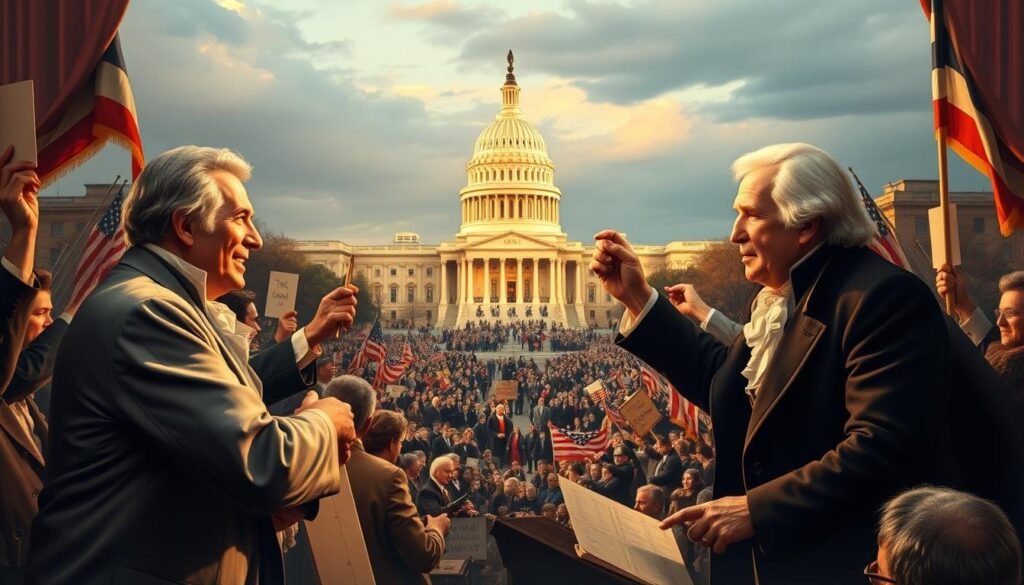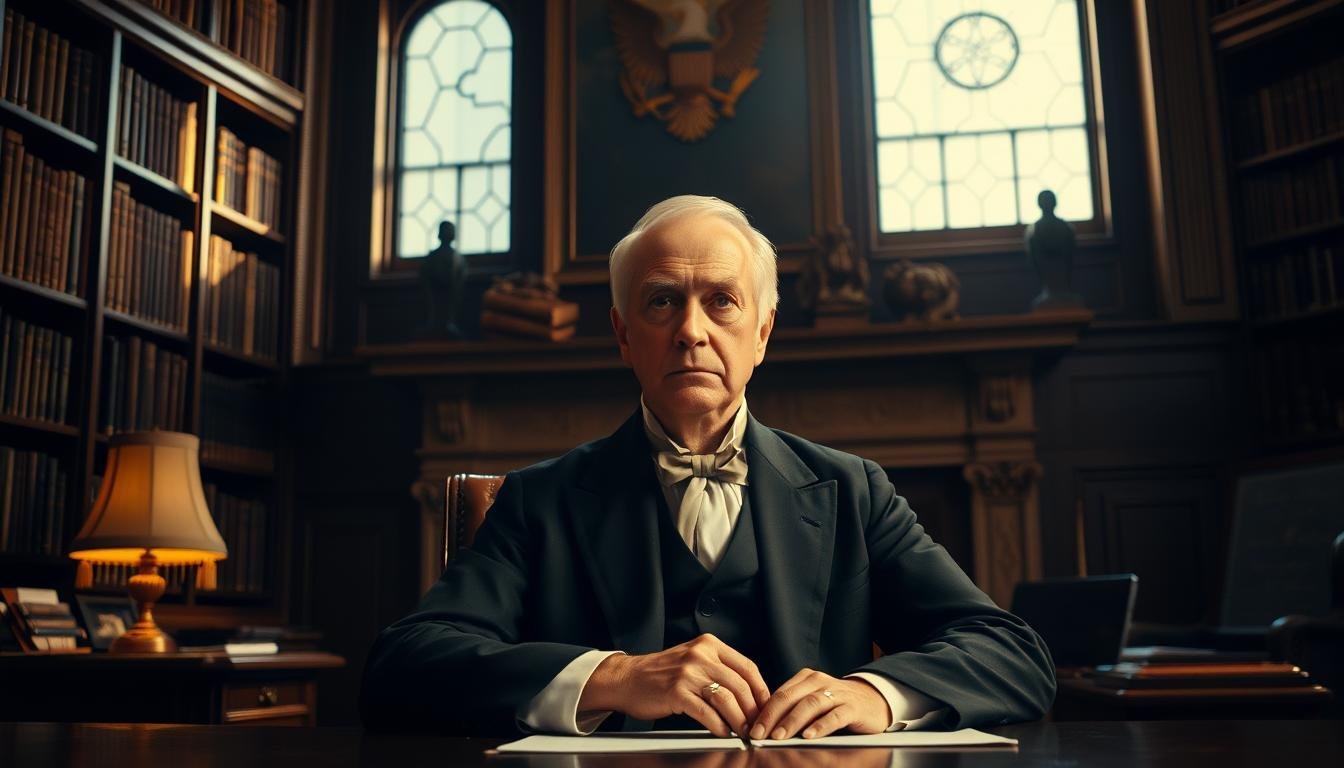Why Was John Quincy Adams Unpopular? Have you ever wondered why John Quincy Adams was not well-liked by many? He was the sixth President of the United States. His time in office was filled with important events and choices that hurt his image.
Adams had to deal with a lot of opposition, even from his own party. He also disagreed with others over his policies. His strong beliefs and unwillingness to give in made him unpopular.
Learning about Adams’ unpopularity can help you understand his presidency better. It also sheds light on the historical context he faced.
Contents
- 1 The Path to the Presidency
- 2 What Contributed to the Unpopularity of President John Quincy Adams
- 3 Adams’ Ambitious but Rejected Domestic Agenda
- 4 Political Climate and Partisan Obstacles
- 5 Foreign Policy Approaches That Alienated Voters
- 6 The Bitter Election of 1828
- 7 Post-Presidential Redemption and Legacy
- 8 Conclusion: Why Was John Quincy Adams Unpopular?
- 9 FAQ
- 9.1 Why was John Quincy Adams considered unpopular during his presidency?
- 9.2 What role did the House of Representatives play in John Quincy Adams’ election as president?
- 9.3 What were some of the key domestic policies proposed by John Quincy Adams, and why were they rejected?
- 9.4 How did John Quincy Adams’ foreign policy approaches impact his popularity?
- 9.5 What was the significance of the 1828 election in John Quincy Adams’ presidency?
- 9.6 How did John Quincy Adams achieve redemption after his presidency?
- 9.7 What lessons can be learned from John Quincy Adams’ unpopular presidency?
- 9.8 How is John Quincy Adams’ legacy viewed today?
The Path to the Presidency
John Quincy Adams’ presidency started with a disputed election. In the 1824 election, no one got a majority of electoral votes. This led to the House of Representatives deciding the winner.
The Role of the House of Representatives
The House of Representatives was key in Adams’ win. After a contentious process, Adams was chosen president on the first House vote. He didn’t win the most electoral or popular votes.
This unusual start made Adams unpopular. Many felt he was unfairly chosen. These feelings were just the beginning of his presidency’s challenges.
- The controversial election process
- Lack of a clear mandate
- Perceptions of elitism
These issues made Adams’ presidency tough. It was hard for him to push through his plans.
What Contributed to the Unpopularity of President John Quincy Adams
John Quincy Adams’ unpopularity wasn’t just about his policies. His personal traits also played a big part. His intellectual elitism and lack of charisma were key factors.
Intellectual Elitism and Lack of Charisma
Adams was known for his intellectual prowess. But this made him seem distant from everyday people. His lack of charisma made it hard for him to connect with the public emotionally.
- He was seen as being out of touch with the average American.
- His intellectual approach to politics was often misunderstood as being elitist.
- Adams struggled to build a personal connection with the electorate.
Refusal to Engage in Political Patronage
Adams’ refusal to engage in political patronage also hurt his popularity. By not rewarding his supporters with government jobs, he lost many allies.
- It weakened his political base by not providing incentives to his supporters.
- It made him appear stubborn and unwilling to compromise.
- Adams’ approach to political appointments was seen as principled but ultimately detrimental to his popularity.
In conclusion, Adams’ intellectual elitism, lack of charisma, and refusal to engage in political patronage hurt his popularity. These traits made it hard for him to keep public support and navigate the political landscape of his time.
Adams’ Ambitious but Rejected Domestic Agenda
Adams’ presidency was filled with big plans for the country. You might think a former Secretary of State would know exactly what to do. He wanted to build roads, canals, and bridges. He also dreamed of a national university and an astronomical observatory.
These ideas were meant to make the nation stronger and more united. But, Congress didn’t agree. They were worried about the cost and who would benefit. Many saw Adams’ plans as too big for the government to handle.
When Congress said no to Adams’ plans, it hurt his popularity. People got frustrated because he couldn’t get anything done. This made Adams even less popular with the public.
In short, Adams’ big plans were a big reason for his unpopularity. Congress and the public didn’t like them. This made Adams’ time in office very tough.
Political Climate and Partisan Obstacles
Adams faced strong opposition during his presidency. The political climate was tense, with the Democratic-Republicans and the Democratic Party at odds.
These partisan obstacles made it hard for Adams to push through his plans. Many of his ideas were blocked, thanks to opposition from figures like Andrew Jackson and Martin Van Buren.
The following table outlines key aspects of the political climate and partisan obstacles during Adams’ presidency:
| Aspect | Description | Impact |
|---|---|---|
| Partisan Divisions | Increasing tensions between Democratic-Republicans and Democrats | Legislative gridlock |
| Opposition Leadership | Andrew Jackson and Martin Van Buren led the opposition | Blocked key legislation |
| Domestic Agenda | Proposals for infrastructure and education | Failed to pass due to opposition |
Understanding the political climate and partisan obstacles during Adams’ presidency gives us insight into his challenges. These factors greatly impacted his ability to lead effectively.
Foreign Policy Approaches That Alienated Voters
John Quincy Adams’ foreign policy decisions were seen as controversial. Many voters felt alienated by his actions. His belief in American exceptionalism and desire for global influence shaped his policies.
The Treaty of Panama, or Congress of Panama, was a key issue. It aimed to unite Central and South America against Spanish attempts to recolonize. But, many in Congress doubted its wisdom, seeing it as an abuse of power.
The table below shows Adams’ foreign policy decisions and their outcomes.
| Foreign Policy Decision | Outcome |
|---|---|
| Treaty of Panama | Failed to gain Congressional approval |
| Negotiations with British on trade and border | Resulted in the U.S.-Great Britain Border Treaty |
| Support for Greek independence | Increased public sympathy but did not translate into political capital |
Adams’ foreign policy, though aimed at good, made him unpopular. The lack of major successes and the unresolved issues led to widespread criticism.
The Bitter Election of 1828
The 1828 presidential election was one of the most bitter in U.S. history. It was a rematch between President John Quincy Adams and Andrew Jackson. Jackson had lost to Adams in 1824, despite getting more popular votes.
The campaign was filled with personal attacks and mudslinging. Adams was seen as too aristocratic, while Jackson was called unfit for the presidency. This election showed the deep divisions in the country, with Adams becoming increasingly unpopular.

| Candidate | Party | Electoral Votes |
|---|---|---|
| Andrew Jackson | Democratic | 178 |
| John Quincy Adams | National Republican | 83 |
Andrew Jackson won decisively, getting 178 electoral votes to Adams’ 83. This victory ended Adams’ presidency and showed the public’s discontent with his leadership.
Post-Presidential Redemption and Legacy
John Quincy Adams made his biggest impact after leaving the White House. He went back to Massachusetts and started practicing law again. But, he soon wanted to serve the public once more.
In 1830, Adams was elected to the House of Representatives. He held this position until his death in 1848. He was a strong voice against slavery, pushing for the right to speak out against it.
His work was key in fighting the gag rule. This rule stopped Congress from discussing slavery. Adams’ efforts helped the anti-slavery movement a lot.
| Year | Event | Significance |
|---|---|---|
| 1830 | Elected to House of Representatives | Marked return to public service |
| 1836 | Led fight against gag rule | Instrumental in anti-slavery movement |
| 1848 | Died in office | Legacy cemented as anti-slavery advocate |
Adams’ life after the presidency showed his deep commitment to public service. His work against slavery has had a lasting effect on American history. His true impact was seen in the years after his presidency, not during it.
Conclusion: Why Was John Quincy Adams Unpopular?
John Quincy Adams’ presidency was marked by unpopularity, despite his big plans and important contributions. His story teaches us about the complex nature of presidential legacies. It shows what makes a president unpopular.
Reflecting on Adams’ presidency, we learn important lessons. Building coalitions and handling partisan politics are key to success. Adams failed in these areas, leading to his unpopularity and loss in 1828.
Adams’ presidency reminds us that a president’s legacy is influenced by many things. This includes domestic and foreign policies, and their ability to work with Congress and the public. Studying his presidency helps us understand the challenges of the office better.
See Also: Reasons Behind Bush’s Unpopularity as President
FAQ
Why was John Quincy Adams considered unpopular during his presidency?
John Quincy Adams was seen as out of touch because of his intellectualism. He lacked charisma and didn’t play the political game of patronage. This made it hard for him to connect with politicians and the public.
What role did the House of Representatives play in John Quincy Adams’ election as president?
The House of Representatives was key in Adams’ election. The election went to the House after no one got a majority of electoral votes. This made him unpopular.
What were some of the key domestic policies proposed by John Quincy Adams, and why were they rejected?
Adams wanted to improve the country with big projects and education. But Congress said no because of party fights and worries about the government’s power.
How did John Quincy Adams’ foreign policy approaches impact his popularity?
Adams’ foreign policy, like trying to work with Native Americans and the Panama Congress, got a lot of criticism. This hurt his popularity.
What was the significance of the 1828 election in John Quincy Adams’ presidency?
The 1828 election was very hard and showed how unpopular Adams was. He lost to Andrew Jackson.
How did John Quincy Adams achieve redemption after his presidency?
After leaving office, Adams had a great career in Congress. He fought for ending slavery and other important causes. This helped fix his reputation.
What lessons can be learned from John Quincy Adams’ unpopular presidency?
Adams’ presidency shows how important it is to connect with people and politicians. Good communication and leadership are key to success in the presidency.
How is John Quincy Adams’ legacy viewed today?
Now, Adams is seen as a complex figure. His legacy includes both great achievements and challenges, like his unpopular presidency.

Hi, I am Tatum Bradford from Washington. I have a background in political science and work as a senior revenue officer. I love learning about U.S. presidents and sharing interesting facts about political history.

